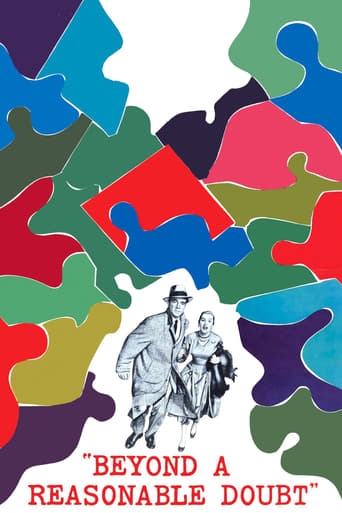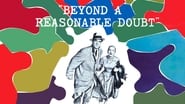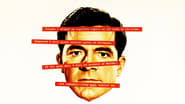secondtake
Beyond a Reasonable Doubt (1956)An early wide screen black and white drama that marks the end of Fritz Lang's American career and also shows the winding down of two great stars, Joan Fontaine and Dana Andrews. The film is no send off, exactly, but it is slightly tired, as if the formula of movie-making needs a twist and it isn't here.That's not the point, of course. This is now the mid-fifties, crisis time for Hollywood, and with widescreen (and widescreen color) movies making a final jab at the rise of television. The plot is sensational, and not too far from what an extended early television drama might try, with mostly interior shooting and a staged (sometimes stagey) presentation. In all it's not Lang's best, and he was a master at both noir/expressionist drama and at getting to the human dilemma of fate and murder. Andrews and Fontaine are not a bad pair—both are matched in calm and sophistication, and beauty, even, though Fontaine seems like an accessory until the very end. Andrews rules the plot, which makes him out to be a writer desperate for a new story. So desperate he's going to pretend to commit a murder just to test the justice system.It's all so outrageous you want to believe it, though your mind says it just wouldn't happen. It's too convenient, and one man's suggestion from the newspaper turns out to be the other man's reality. Enough said!Oddly enough, this is an RKO distribution even after the studio's demise (I don't know the reasons there) but it might point to a less than perfect crew. Certainly the cinematographer, which Lang relied on greatly in earlier films, is no one with credentials. Likewise the editing and writing are fairly routine, even lackluster. And so if a movie that depends on some psychological intensity is really a bit of a grunt effort, whatever the star power involved, it's a bit doomed. So watch this if you are curious about any of the parts. I'm a fan of all three of the principles here, and so had to watch it. But I didn't walk away impressed.
jc-osms
I'm always pleased to catch a Fritz Lang thriller on the TV schedules and was surprised to learn from IMDb that this was in fact his last Hollywood feature. To be honest, it doesn't really compare to his best work, being quite plot-heavy and not perhaps offering him much inspiration for his customary flourishes. That said it does start very sombrely with a near-silent depiction of an electric-chair execution, before the main, convoluted plot-line kicks in with a too blatant anti-capital punishment message. There's little else for the old maestro to do but try to follow the ins and outs of the story, which is too unbelievable and predicated on coincidence to really convince with even the twist at the end just too far-fetched and under-powered to finish the film on any kind of high, plus the complete absence throughout of any other suspect makes the final denouement obvious in the extreme. It is possible to detect Lang pushing the boundaries a little a la Preminger with occasionally risqué dialogue and Dana Andrews interaction with the strippers but "Anatomy Of A Murder" this isn't. The acting is solid enough with Dana Andrews and Joan Fontaine only occasionally looking befuddled by the over-intricacies of the narrative but in the end this isn't one of the great director's finest hours and not a film he'll be best remembered for.
Hitchcoc
I have no trouble with the plot twists in this movie or the ending. The thing that amazes me is that the court system would have allowed a man who manipulated the law to just walk away, even if he were found innocent of the murder. He perpetrated fraud and used the justice system so he could write an expose. This just wouldn't happen. Otherwise it's a little like "The Witness for the Prosecution" where we think we've got it and the rug is pulled out from under us. Dana Andrews emotes and prances about, self righteous to a fault. Of course, with the movie codes of the day, there are issues that need to be addressed, especially at the conclusion. Then there is basic loyalty versus the law. These are all themes. For the most part it just doesn't work that well for me.
Howard_B_Eale
Sometimes, in the world of 1940s-1950s film noir, we are given a film so transparently impossible and contrived that we can see ourselves giving up on watching it half way through. But is extremely rare that we are faced with a film where the very response the viewer is having holds the key to the success, rather than the failure, of the film.Such is the case with BEYOND A REASONABLE DOUBT, which has - to its credit - been completely misunderstood by many. When we reach the film's conclusion, we realize that even the title of the film itself is a joke, perhaps the ultimate prank on the viewer. Yet to offer analysis of the film would be to destroy its main and most sinister motive; you can't "explain away" the glaring plot holes and contrivances without revealing the twist the film takes in its climax, and to do would rob the viewer of a genuine experience. So... I won't.Suffice it to say, BEYOND A REASONABLE DOUBT is far more than it seems and is nothing without the sum of its parts, in total. Lang tackles the story of a person who creates a fictitious role for himself in order to, essentially, pull a fast one on the legal profession for personal gain (or, as it appears on the surface, someone else's). In the world of film noir, of course, we know that such a character won't get away with it, but when Lang depicts the tragedy the viewer knows will come, he majestically turns the entire premise on its head. As a result, it's a cold slap in the face - a devastating critique of the complicity of the audience in following along, hungrily, with such contrivances in cinema.Every part of the film fits perfectly by not fitting at all. Even the visual style of the film is a cold, rarely pleasing one, almost daring you to suspend your disbelief just a little bit longer without even granting the pleasure of emotionally charged close-ups at key moments. The editing is brutal and jarring, cutting away practically mid-sentence and moving to a similar conversation elsewhere.As a swan song to his Hollywood career, BEYOND A REASONABLE DOUBT does to the audience what Billy Wilder does to the industry in SUNSET BLVD. - biting the hand that feeds. The result is a total masterpiece.






